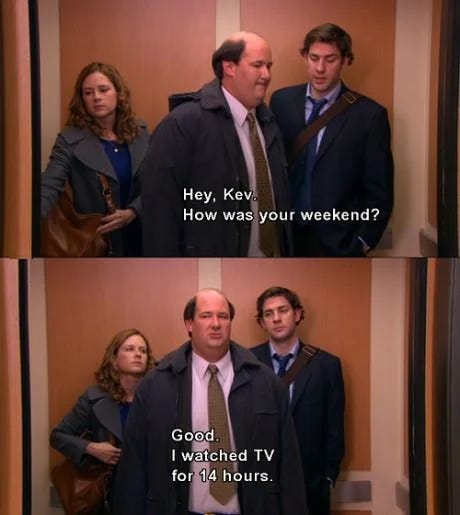The 4-day-week is no longer a utopian dream
We have good news coming from the 4-day-week experiment in the UK
Hello, readers.
First of all, I forgot to let you know last Friday that I would not send the newsletter on Tuesday. In the middle of Carnival, readers and the author deserved a rest. We're back.
I welcome the readers who arrived in the last few days. I am proud to say that we are already more than 200 in this newsletter. At No Direction Home, I share the challenges and learnings of my life as a digital nomad, give tips and valuable information for those who want to be one, and discuss flexible work models.
This last topic is the subject of today's edition. We had important news this week in the search for alternatives to the old 9-5 model from Monday to Friday.
The UK's 4-day-week experiment (in partnership with think tank Autonomy, the 4 Day Week UK Campaign, and researchers at Cambridge University and Boston College) has announced its result. From June to December 2022, 61 companies and around 2900 employees participated in this test, with one day off.
The results are encouraging.
92% of companies will maintain the model
Burnout reports dropped by 71% and stress reports by 39%
Sick days are down by 65%
The number of staff leaving companies dropped by a whopping 57% over the trial period
Organizations reported revenue increases of 35% on average, compared to the same period from previous years
15% of employees said that no money would induce them to accept a five-day week schedule
The 4-day-week movement preaches the 100-80-100 model: 100% of the pay, 80% of the time, and 100% of the output. "Focus on those things that are productive and stop what is not. Reduce the working days but not reduce the pay," says Andrew Barners, 4 Day Week Pioneer. The main goal is to prove that cutting hours can boost employees’ productivity.
Other companies in countries like New Zealand, Iceland, Portugal, United Arab Emirates and Brazil have had success with 4-day-week trial. The newest to join the list is South Africa, with 29 companies and over 500 employees from March 1st, in a six-month validity.
It is necessary to control the euphoria and scrutinize several factors that may have affected it. Would these companies be more inclined to the model and, therefore, more susceptible to positive results? We learned during the pandemic the importance of randomized and double-blind studies.
Furthermore, the results were obtained from self-assessment, which can be highly subjective.
In addition, the increase in profit could result from seasonal factors or pent-up demand from the pandemic.
Like any critical change, further testing is required. There were declarations that the beginning of the project was chaotic in some companies. Did they genuinely adapt?It's a great sign that 56 of the 61 companies will continue to adopt the model —18 permanently. The longer the timescale of the test, the better. And visibility attracts more companies.
It is encouraging to know that small companies without ties to these campaigns are also doing tests. It is the case of the Brazilian company Studio750, which adopted the model in January.
Elea Almeida, one of the founders, declares:
Greater organization of projects, deliveries, and demands
Improved communication between the entire team
Increased overall productivity and reduced delivery times
Improvement in quality of life and decrease in everyone's stress level.
The day off mustn't turn the other four days into a nightmare of exhaustion. I am a journalist, and, in all my jobs, taking a day off or a vacation was always challenging, as it was necessary to work a lot the days before so that the projects would be ready on time.
It may even seem like the problem is me, but I'm confident that's not the case, as all my colleagues faced the same drama. Before moving to a 4-day-week, we need to improve the division of labor and avoid overloading. It is often such a scenario: To stand out and be promoted you must get into a new project or try something distinct (which may require extra work hours).
It's okay to be hardworking, but how to be efficient? When considering the 4-day-week, we need to look at the entire organizational structure and eliminate what is unnecessary. Does the team meeting really need to be daily? Can't the call with the partner be an email? How to increase my focus after lunch?
Having a three-day weekend is a dream that seemed unrealistic a few years ago and is slowly becoming a reality. If to get it the cost is to organize me, my team, and all my company better during the week, I'm willing to try.
And we have yet to talk about remote work within the 4-day-week. If I have three days of rest and another one working from home, we are considering three face-to-face days, which is totally acceptable. It is this flexibility that No Direction Home dreams of and will defend in each post.




